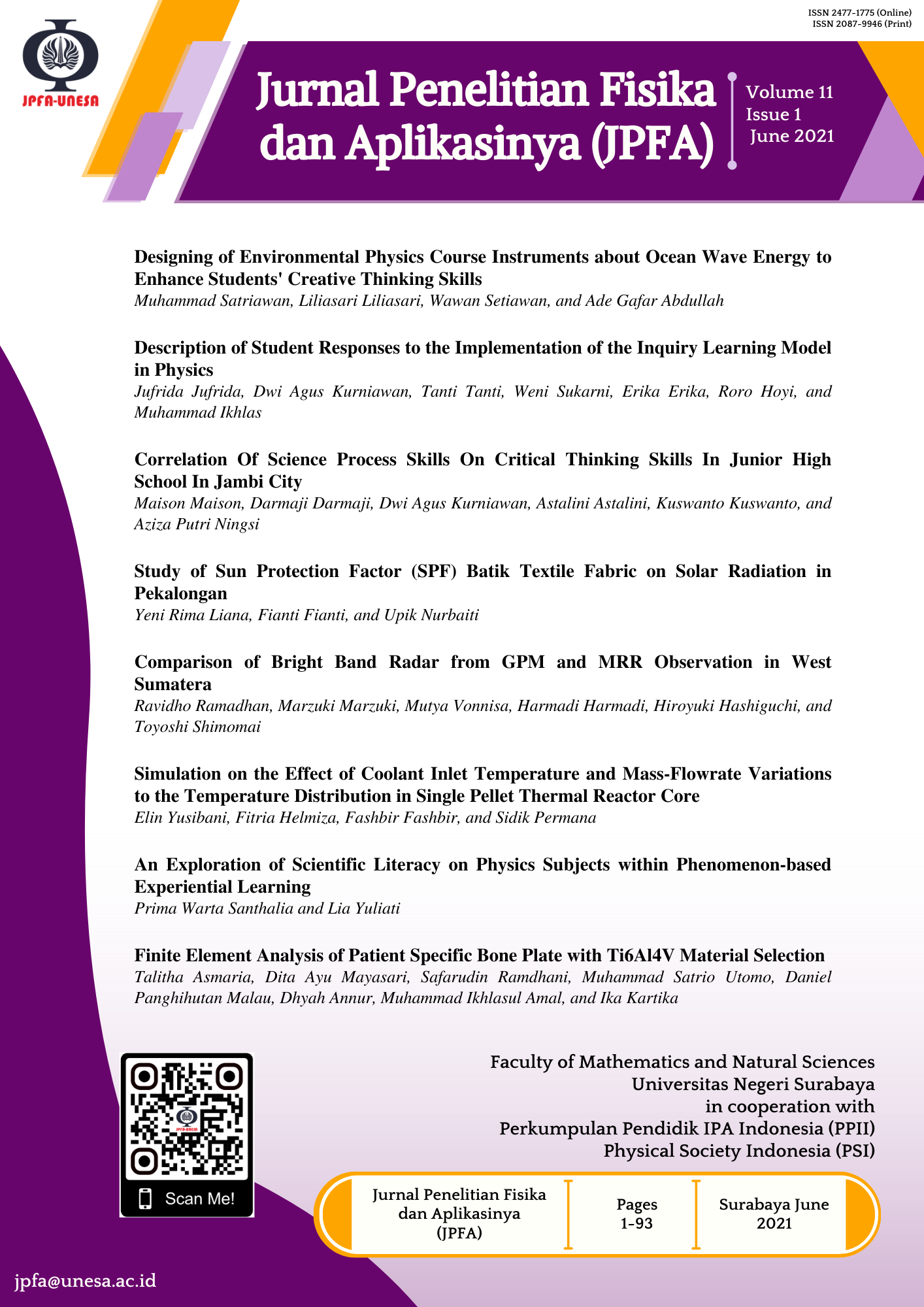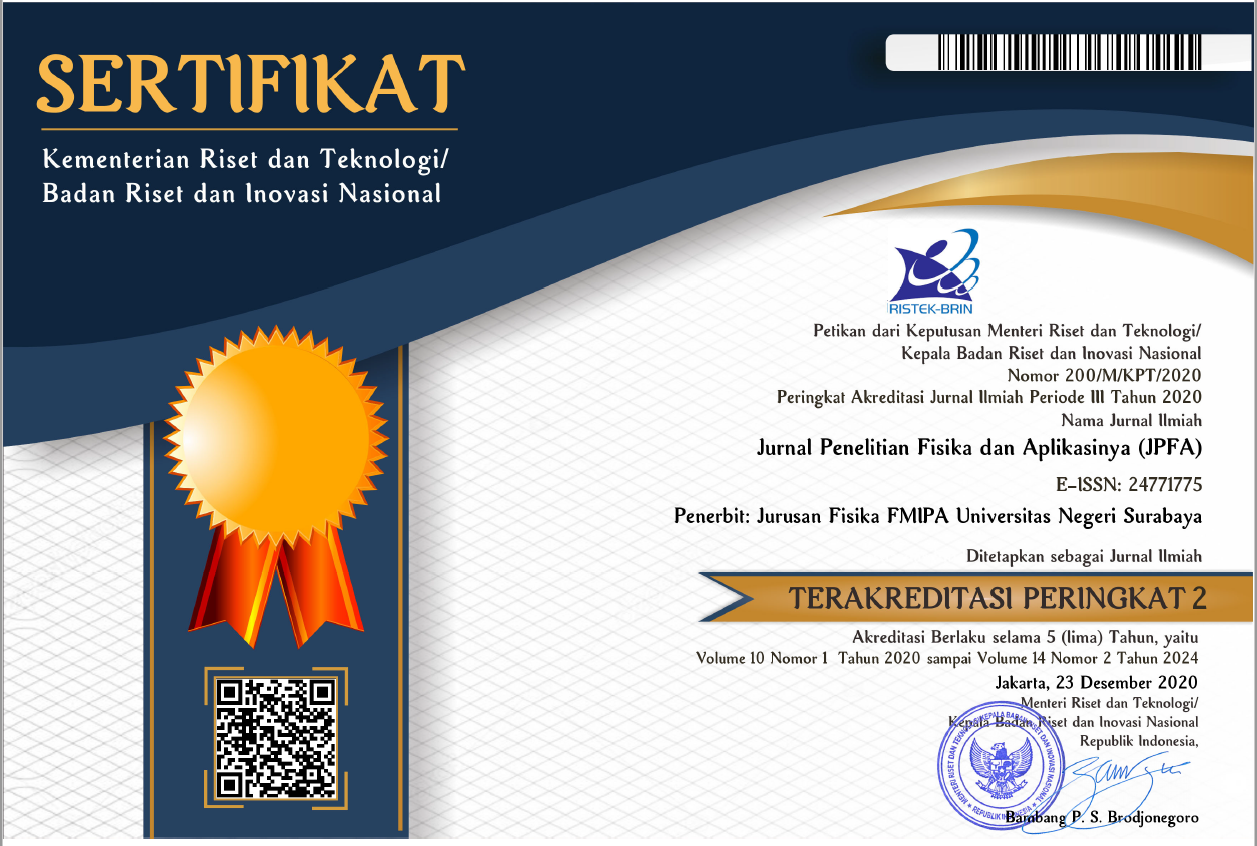Description of Student Responses to the Implementation of the Inquiry Learning Model in Physics
DOI:
https://doi.org/10.26740/jpfa.v11n1.p16-28Keywords:
Inquiry learning model, Physics, Student response, CurriculumAbstract
The model of learning is one of the approaches of strategy that teachers must carry out in a systematic and procedural to regulate the activities of learning to achieve the goal of learning. The process of learning by using a model of learning inquiry can increase the activity of the students, the courage of students in revealing ideas and ideas, and improve students' science process skills in the physics learning process. The purpose of the research is to know how students' response to models of learning of inquiry was used at the time of learning physics and see whether the application of the model the students are more skilled in learning. Research is conducted in SMA Negeri 8 Muaro Jambi on student grade X IPA 1, which aims to determine students' response when given an inquiry learning model during the process of learning physics. The instrument that is used is a questionnaire of students with a sample of 21 students. This study used a mixed-method with a sequential explanatory design. The descriptive statistics were employed in the data analysis technique to obtain the average, mode, median, minimum, and maximum values. Based on the findings of this study, it is possible to conclude that using inquiry learning models in physics learning can boost student activity, independence, and science skills. This is demonstrated by the students' responses in quite good categories. Students feel accountable for formulating, analyzing, and solving problems when using the inquiry learning methodology. So that students can learn physics in a more meaningful way, and the material is easier to retain. The student response rate to the learning model is rated as satisfactory.
References
Darmaji, Astalini, Kurniawan DA, Perdana R, and Putra DS. A Study Relationship Attitude Toward Physics, Motivation, and Character Discipline Students Senior High School, in Indonesia. International Journal of Learning and Teaching. 2019; 11(3): 99-109. DOI: http://dx.doi.org/10.18844/ijlt.v11i3.4207.
Putri AR, Maison, and Darmaji. Kerjasama dan Kekompakan Siswa dalam Pembelajaran Fisika di Kelas XII MIPA SMAN 3 Kota Jambi. Edufisika: Jurnal Pendidikan Fisika. 2018; 3(2): 32-40. DOI: http://dx.doi.org/10.22437/edufisika.v3i02.5552.
Darmaji, Kurniawan DA, Suryani A, and Lestari A. An Identification of Physics Pre-Service Teachers'science Process Skills Through Science Process Skills-Based Practicum Guidebook. Jurnal Ilmiah Pendidikan Fisika Al-Biruni. 2018; 7(2): 239-245. DOI: http://dx.doi.org/10.24042/jipfalbiruni.v7i2.2690.
Usman EA, Cahyati MT, Putri YA, and Asrizal. Meta Analisis Pengaruh Penerapan Model Inquiry-Based Learning dalam Pembelajaran Fisika untuk Menjawab Tantangan Kurikulum 2013 Pada Abad 21. Pillar of Physics Education. 2019; 12(4): 873-880. Available from: http://ejournal.unp.ac.id/students/index.php/pfis/article/view/7911.
Agustin EW and Sugiyono. Development of Curriculum 2013 as an Effort to Improve the Quality of Education in Indonesia. Proceedings of the 3rd International Conference on Current Issues in Education: Advances in Social Science, Education and Humanities Research. 2018; 326: 178-182. DOI: https://dx.doi.org/10.2991/iccie-18.2019.32.
Supriatna E. Penerapan Model Pembelajaran Problem Based Learning (PBL) Untuk Meningkatkan Hasil Belajar Siswa. Journal of Classroom Action Research. 2020; 2(1): 15-19. DOI: https://doi.org/10.29303/jcar.v2i1.398.
Prabowo LSB and Sunarti T. Penerapan Model Pembelajaran Inkuiri pada Materi Alat Optik untuk Meningkatkan Keterampilan Berpikir Kritis Siswa Kelas VII SMP Cendekia Sidoarjo. Jurnal Inovasi Pendidikan Fisika (JIPF). 2015; 4(1): 6-11. Available from: https://jurnalmahasiswa.unesa.ac.id/index.php/inovasi-pendidikan-fisika/article/view/11084.
Ulfah M, Fatmah H, and Herlanti Y. Penerapan Model Pembelajaran Problem Based Learning (PBL) Dipadu Metode Student Team Achievement Division (STAD) untuk Meningkatkan Hasil Belajar Peserta Didik Kelas X IPA 4 SMA Negeri 1 Parung Tahun Ajaran 2014/2015 pada Konsep Perubahan Lingkungan dan Daur Ulang Limbah. EDUSAINS. 2015; 7(2): 202-208. DOI: http://dx.doi.org/10.15408/es.v7i2.2789.
Annisak SK, Indriyanti NY, and Mulyani B. Constructive Controversy dan Inkuiri Terbimbing Sesuai Representasi Tetrahedral Pembelajaran Kimia Ditinjau dari Kemampuan Berpikir Kritis. Jurnal Inovasi Pendidikan IPA. 2019; 5(1): 10-22. DOI: https://doi.org/10.21831/jipi.v5i1.20448.
Wahyuni S, Kosim, and Gunawan. Pengembangan Perangkat Pembelajaran Fisika Berbasis Inkuiri Terbimbing Berbantuan Eksperimen untuk Meningkatkan Penguasaan Konsep Siswa. Jurnal Pendidikan Fisika dan Teknologi. 2018; 4(2): 240-246. DOI: http://dx.doi.org/10.29303/jpft.v4i2.891.
Putri YA, Usman EA, and Cahyati MT. Meta-Analisis Pengaruh penggunaan Model Inquiry Based Learning terhadap Kompetensi Keterampilan Peserta Didik dalam Pembelajaran Fisika. Jurnal Penelitian Pembelajaran Fisika. 2019; 5(1): 65-72. Available from: http://ejournal.unp.ac.id/index.php/jppf/article/view/107423.
Gunawan, Harjono A, Hermansyah, and Herayanti L. Guided Inquiry Model Through Virtual Laboratory to Enhance Students' Science Process Skills on Heat Concept. Cakrawala Pendidikan. 2019; 38(2): 259-268. DOI: http://dx.doi.org/10.21831/cp.v38i2.2334 .
Simbolon DH and Sahyar. Pengaruh Model Pembelajaran Inkuiri Terbimbing Berbasis Eksperimen Riil dan Laboratorium Virtual Terhadap Hasil Belajar Fisika Siswa. Jurnal Pendidikan dan Kebudayaan. 2015; 21(3): 299-315. DOI: http://dx.doi.org/10.24832/jpnk.v21i3.192.
Sasmita PR. Penerapan Metode Inkuiri Terbimbing Menggunakan Media Kit Fisika: Upaya Meningkatkan Aktivitas dan Hasil Belajar Fisika Siswa. Jurnal Ilmiah Pendidikan Fisika Al-Biruni. 2017; 6(1): 95-102. DOI: http://dx.doi.org/10.24042/jpifalbiruni.v6i1.599.
Wartono, Alfroni YF, Batlolona JR, and Mahapoonyanont N. Inquiry-Scaffolding Learning Model: Its Effect on Critical Thinking Skills and Conceptual Understanding. Jurnal Ilmiah Pendidikan Fisika Al-Biruni. 2019; 8(2): 249-259. DOI: http://dx.doi.org/10.24042/jipfalbiruni.v8i2.4214.
Maison, Astalini, Kurniawan DA, and Sholihah LR. Deskripsi Sikap Siswa SMA Negeri pada Mata Pelajaran Fisika. EDUSAINS. 2018; 10(1): 160-167. DOI: https://doi.org/10.15408/es.v10i1.7214.
Bazrafkan L, Hayat AA, Tabei SZ, and Amirsalari L. Clinical Teacher as a Positive and Negative Role Model: An Explanatory Sequential Mixed Method Design. Journal of Medical Ethics and History of Medicine Research Center. 2019; 12(11): 1-15. DOI: http://dx.doi.org/10.18502/jmehm.v12i11.1448.
Rukajat A. Pendekatan Penelitian Kuantitatif. Yogyakarta: Deepublish; 2018.
Isnawati, Jalinus N, and Risfendra. Analisis Kemampuan Pedagogi Guru SMK yang sedang Mengambil Pendidikan Profesi Guru dengan Metode Deskriptif Kuantatif dan Metode Kualitatif. INVOTEK: Jurnal Inovasi Vokasional dan Teknologi. 2020; 20(1): 37-44. DOI: http://dx.doi.org/10.24036/invotek.v20i1.652.
Sari DD. Penerapan Model Problem Base Learning (PBL) untuk Meningkatkan Kemampuan Berpikir Kritis Peserta Didik pada Pembelajaran IPA Kelas VII SMP Negeri 5 Sleman. Yogyakarta: Universitas Negeri Yogyakarta; 2012.
Hardiyanti K, Astalini, and Kurniawan DA. Sikap Siswa Terhadap Mata Pelajaran Fisika di SMA Negeri 5 Muaro Jambi. Edufisika: Jurnal Pendidikan Fisika. 2018; 3(2):1- 12. DOI: http://dx.doi.org/10.22437/edufisika.v3i02.4522.
Astalini, Kurniawan DA, and Sumaryanti. Sikap Siswa Terhadap Pelajaran Fisika di SMAN Kabupaten Batanghari. Jurnal Ilmu Pendidikan Fisika. 2018; 3(2); 59-64. DOI: http://dx.doi.org/10.26737/jipf.v3i2.694.
Sugiyono. Metode Penelitian Kuantitatif, Kualitatif, dan R&D. Bandung: Alfabeta; 2016.
Lidiana H, Gunawan, and Taufik M. Pengaruh Model Discovery Learning Berbantuan Media Phet Terhadap Hasil Belajar Fisika Peserta Didik Kelas XI SMAN 1 Kediri Tahun Ajaran 2017/2018. Jurnal Pendidikan Fisika dan Teknologi. 2018; 4(1): 33-39. DOI: http://dx.doi.org/10.29303/jpft.v4i1.519.
Setiawan B, Sunarti T, and Astriani D. The Application Of Inquiry Learning Model To Improve "Satu Atap" Students' Learning Results at SMPN 4 Singosari Malang. Jurnal Pendidikan IPA Indonesia. 2016; 5(1): 45-50. DOI: http://dx.doi.org/10.15294/jpii.v5i1.5788.
Anam K. Pembelajaran Berbasis Inkuiri: Metode dan Aplikasi. Yogyakarta: Pustaka Pelajar; 2015.
Tornee N, Bunterm T, and Tang KN. The Impacts of Inquiry-Based Learning Model on Teaching Science Subject: A Case Study in Thailand. TOJET: The Turkish Online Journal of Educational Technology. 2017; 395-402. Available from: http://www.ic.kku.ac.th/documents/pdf/tang5.pdf.
Khalaf BK. Traditional and Inquiry-Based Learning Pedagogy: A Systematic Critical Review. International Journal of Instruction. 2018; 11(4): 545-564. DOI: http://dx.doi.org/10.12973/iji.2018.11434a.
Nurhayati, Hasyim M, and Yani A. Development of Physics Learning Device Based on Modified Free Inquiry as a Supporting Curriculum 2013 at Senior High School. Proceedings of the 1st International Conference on Advanced Multidisciplinary Research (ICAMR 2018). 2019; 227: 245-249. DOI: https://dx.doi.org/10.2991/icamr-18.2019.61.
Fatmawati, Sukariasih L, Fayanto S, and Retnawati H. Investigating the Effectiveness of Inquiry Learning and Direct Learning Models toward Physics Learning. Proceedings of the 1st International Conference on Advanced Multidisciplinary Research (ICAMR 2019). 2019; 317: 260-265. DOI: https://dx.doi.org/10.2991/iconprocs-19.2019.54.
Metwally NS, Ebrahim RM, and Husseiny, A. Effect of Inquiry-Based Learning versus Conventional Approach on Maternity Nursing Students' Satisfaction, Motivation, and Achievement. World Journal of Nursing Sciences. 2017; 3(2): 33-44. Available from: https://idosi.org/wjns/3(2)17/1.pdf.
Purba N. Meningkatkan Hasil Belajar Siswa Materi Penerapan Ragam Hias Pada Benda Keras Melalui Model Inquiry Learning Pada Siswa Kelas VIII-B MTsS Keutapang Dua Aceh Besar. Jurnal Serambi Edukasi. 2019; 3(1): 9-18. Available from: http://ojs.serambimekkah.ac.id/serambi-edukasi/article/download/1850/1476.
Nur RA, Haeruddin, and Tewa Y. Penerapan Model Pembelajaran Berbasis Masalah Untuk Meningkatkan Hasil Belajar Siswa Kelas XI IPA 1 SMAN 10 Kendari Pada Materi Asam Basa. Jurnal Pendidikan Kimia Universitas Halu Oleo. 2020; 5(1): 15-19. DOI: http://dx.doi.org/10.36709/jpkim.v5i1.13086
Nasar A and Kurniati K. Comparing Students' Learning Outcomes Using Problem Based Learning Model and Inquiry-Based Learning Model. Jurnal Pendidikan Fisika Universitas Muhammadiyah Makassar. 2020; 8(1): 43-55. DOI: http://dx.doi.org/10.26618/jpf.v8i1.2127.
Halek EF, Oetpah V, and Seran Y. Peningkatan Motivasi dan Hasil Belajar Siswa Melalui Model Pembelajaran Inkuiri Pada Siswa SMA. Jurnal Pendidikan: Teori, Penelitian, dan Pengembangan. 2016; 1(10): 2047-2049. Available from: http://journal.um.ac.id/index.php/jptpp/article/view/7621.
Nisa EK, Koestiari T, Habibbulloh M, and Atmiko B. Effectiveness of Guided Inquiry Learning Model to Improve Students' Critical Thinking Skills at Senior High School. Journal of Physics: Conference Series. 2018; 997: 012049. DOI: http://dx.doi.org/10.1088/1742-6596/997/1/012049.
Havid M, Yulkifli, and Septiani T. Preliminary Analysis to Develop Student Worksheet Based on Inquiry-Based Learning Model for 21st-Century Physics Learning. Journal of Physics: Conference Series. 2020; 1481: 012057. DOI: http://dx.doi.org/10.1088/1742-6596/1481/1/012057.
Downloads
Published
How to Cite
Issue
Section
License
Copyright (c) 2021 Jurnal Penelitian Fisika dan Aplikasinya (JPFA)

This work is licensed under a Creative Commons Attribution-NonCommercial 4.0 International License.
Author(s) who wish to publish with this journal should agree to the following terms:
- Author(s) retain copyright and grant the journal right of first publication with the work simultaneously licensed under a Creative Commons Attribution-Non Commercial 4.0 License (CC BY-NC) that allows others to share the work with an acknowledgement of the work's authorship and initial publication in this journal for noncommercial purposes.
- Author(s) are able to enter into separate, additional contractual arrangements for the non-exclusive distribution of the journal's published version of the work (e.g., post it to an institutional repository or publish it in a book), with an acknowledgement of its initial publication in this journal.
The publisher publish and distribute the Article with the copyright notice to the JPFA with the article license CC-BY-NC 4.0.
 Abstract views: 966
,
Abstract views: 966
, PDF Downloads: 679
PDF Downloads: 679









